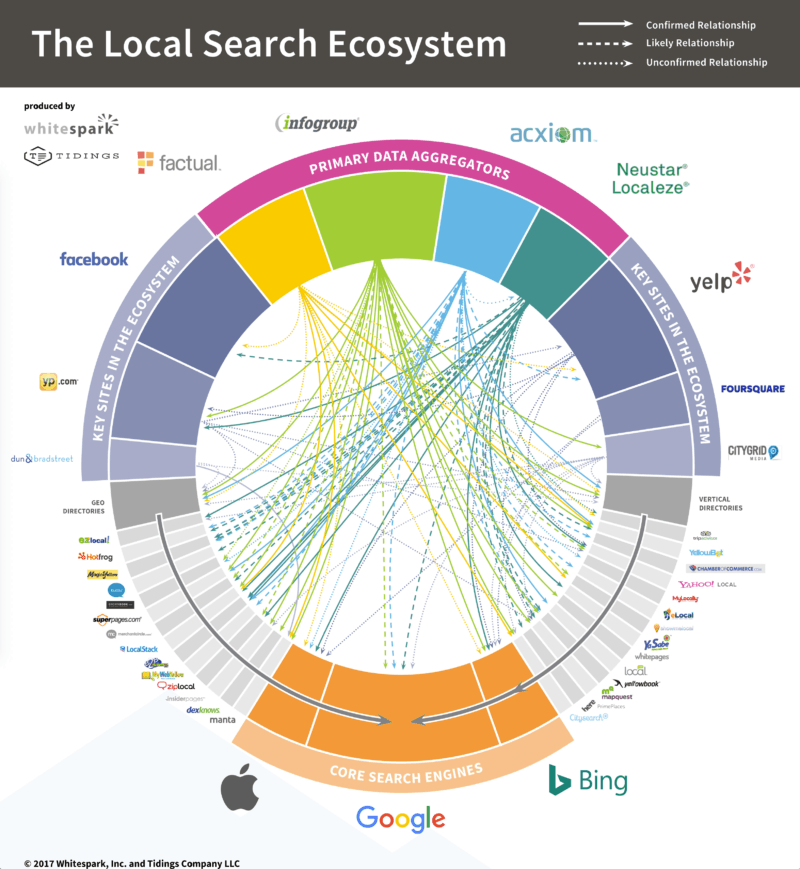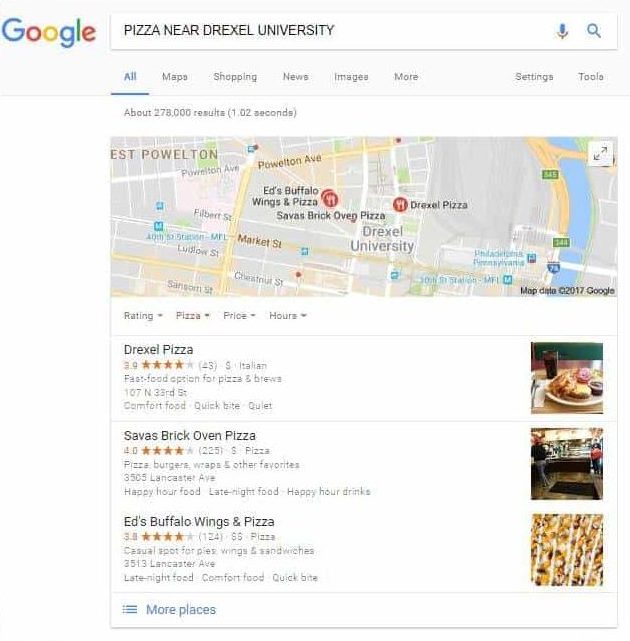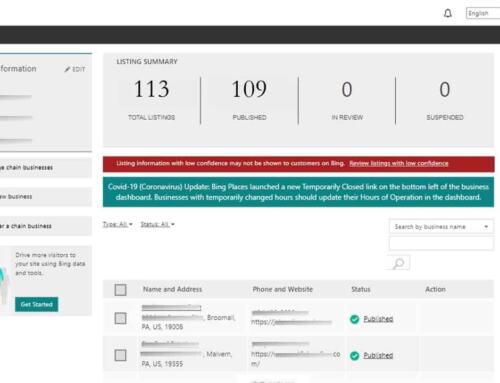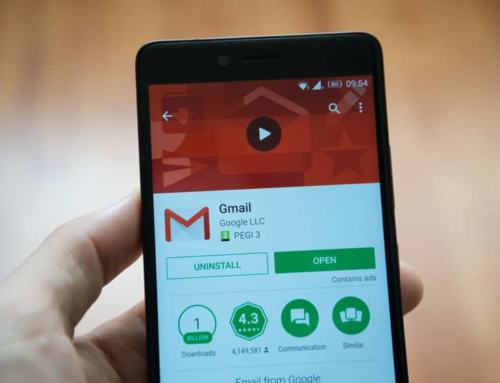Estimated Read Time: 5 Minutes
The local search ecosystem is a complex spiderweb of data providers, search engines, and business directories that all exchange and access business name, address, and telephone number (NAP or citation) data. Citations are something search engines take into consideration when they decide who ranks where in local search results.
Local Search Ecosystem Players
So who are all these players in the local search ecosystem?
- Data providers are commercial local data aggregators or companies that gather, match, cleanse, reformat, and sell individual and business data for profit. You know all that junk mail you receive? A lot of it gets routed to you by way of the local data aggregators.
- Search engines are familiar names like Google, Bing, and Yahoo as well as smaller or lesser-known entities like AOL, DuckDuckGo, and Neeva.
- Business directories run the gambit from historical artifacts like the Yellow Pages and Superpages to geo, navigational, and vertical or niche directories like Trip Advisor, Open Table, and the American Medical Association Doctor Finder.
Origins
The Local Search Ecosystem (LSE) originated with David Mihm, a local small business advocate and owner of Tidings. The latest iteration of the LSE is a dynamic online representation of how data flows between entities in this complex, overlapping collection of local data providers, search engines, and business directories. It is illustrated below, compliments of Whitespark and Tidings, the companies that maintain it now.

Why is the Local Search Ecosystem Important?
Every business wants to rank highly in Google search results. Local is one of the most profitable flavors of search.
- The Google Local 3-pack or “snack pack” appears in the top spot in 93% of searches with local intent.
- 50% of consumers who conduct a local search on their smartphone visit a store within a day.
- 88% of consumers have read the online reviews that accompany local search results to determine the quality of a local business before shopping.
- 72% of consumers say that positive reviews make them trust a local business.
The local search ecosystem is important because the NAP / citation data that flows between the entities in the LSE are critical inputs to the algorithms that decide who ranks where in both local (map) and organic (10 blue link) search results. Citations signal business legitimacy and trustworthiness to search engines who then take that into consideration when deciding where to rank your business listing or content in search results.
How Does Google Decide Who Ranks Where in Local Search Results?
If you are searching for a product or service that Google deems to have local intent (think along the lines of “pizza Philadelphia”, “pizza 19106” or “pizza near me”), it will display a local pack on the first page of search results showing the three closest businesses it considers most relevant and reputable. Ranking decisions are made by an automated algorithm that takes into consideration:
- Proximity – all things being equal, the pizza shop closest / nearest to you or the location mentioned in your search query will rank higher in search results. In densely populated areas where there is more than one of your type of business, search results can vary from block to block.
- Relevance – Google will only show businesses offering the products or services it thinks you are searching for.
- Reputation or Prominence – All things being equal in terms of proximity and relevance, businesses with the highest, most visible, verifiable, and positive online reputation will rank the highest. Prominence derives from online mentions (citations), links, and reviews and can come from map listings, directories, pages, blog posts, and even PDF documents. It boils down to representing the trust and credibility your brand has built up over time with search engines.
Google ranks competing businesses using an automated local search ranking algorithm that takes all these factors into consideration as well as behavioral signals like whether people click on your listing and spend time on your website. Google wants to ensure it is delivering value to its customers. It continuously fine-tunes its local search ranking algorithm as it gets better at understanding what people are actually searching for, what businesses have to offer, and all the different ways scammers try to cheat the algorithm.
Not every input is given equal weight. Proximity tends to get the most weight.
Example Local 3-Pack
This is an example of what a local 3-pack or “snack pack” looks like for the search phrase “pizza near Drexel University”.
You can see all three businesses shown in the Local Pack are in close proximity to Drexel University and categorized as either “Italian” or “Pizza” reflecting Google’s understanding of what the searcher is looking for. (Business categories are displayed below the business name and to the right of the star rating.)
What Can I Do To Help My Rankings?
There are a few things you can do to help your rankings.
First, make sure your Google My Business Listing is claimed, verified, and categorized accurately. It costs nothing to do so. Use your legal business name (don’t stuff keywords in there trying to game the system), and fill out your business information as accurately and completely as possible. Mention the goods and/or services you want to be found for in your business description, in the question and answer section, and in your response to online reviews.
Second, make sure your citations (online mentions) are accurate. Given there can be thousands of online references to a business by name, address, and phone number, it should be no surprise that many are inconsistent and/or inaccurate. Check your online presence and make sure the most important ones are correct in all their details. You don’t have to check and fix every single listing in the ecosystem, but do make an effort to ensure the most popular sources of this information are complete and accurate.
What’s the Best Way to Update Citation Data?
There is no way to ensure 100 consistency and accuracy in all citation data, but making use of a citation building service can definitely help.
A citation building service lets you submit your business name, address, and telephone number data to a single entity that will then take responsibility for ensuring it gets distributed to others. How many “others”, who those others are, and how quickly and accurately the data gets reflected in the local search results varies greatly from service to service.
I did a comparison of local citation building services that is worth looking at. You can start there. A Google search will turn up other comparisons.
Local SEO is far more complex than it seems at first glance. One look at the local search ecosystem should give you a feel for how vast and complex it actually is. Then, when you consider citations are but one factor that goes into Google’s local search ranking algorithm, you can begin to appreciate why local SEO can be challenging.
HERO IMAGE CREDIT: © Copyright Nigel Mykura and licensed for reuse under a Creative Commons Licence.








Leave A Comment